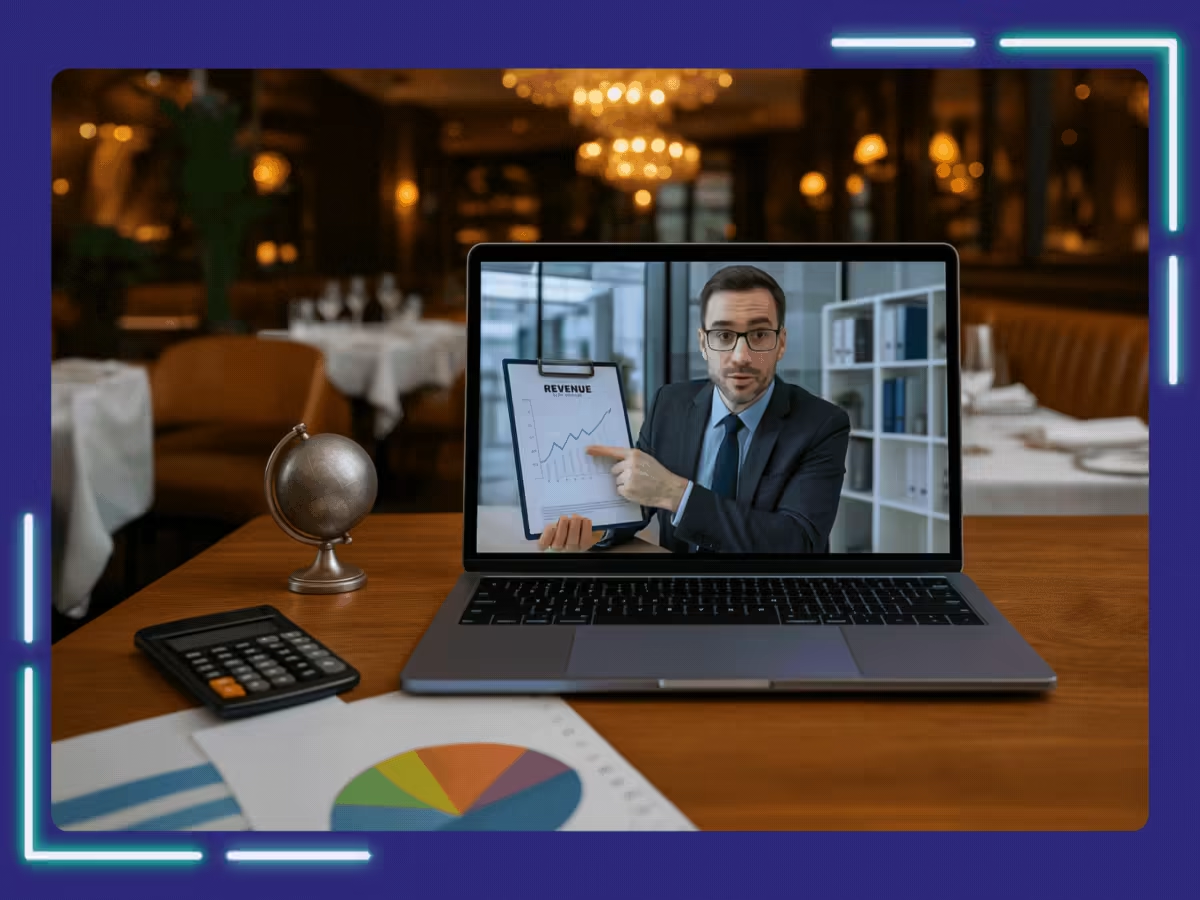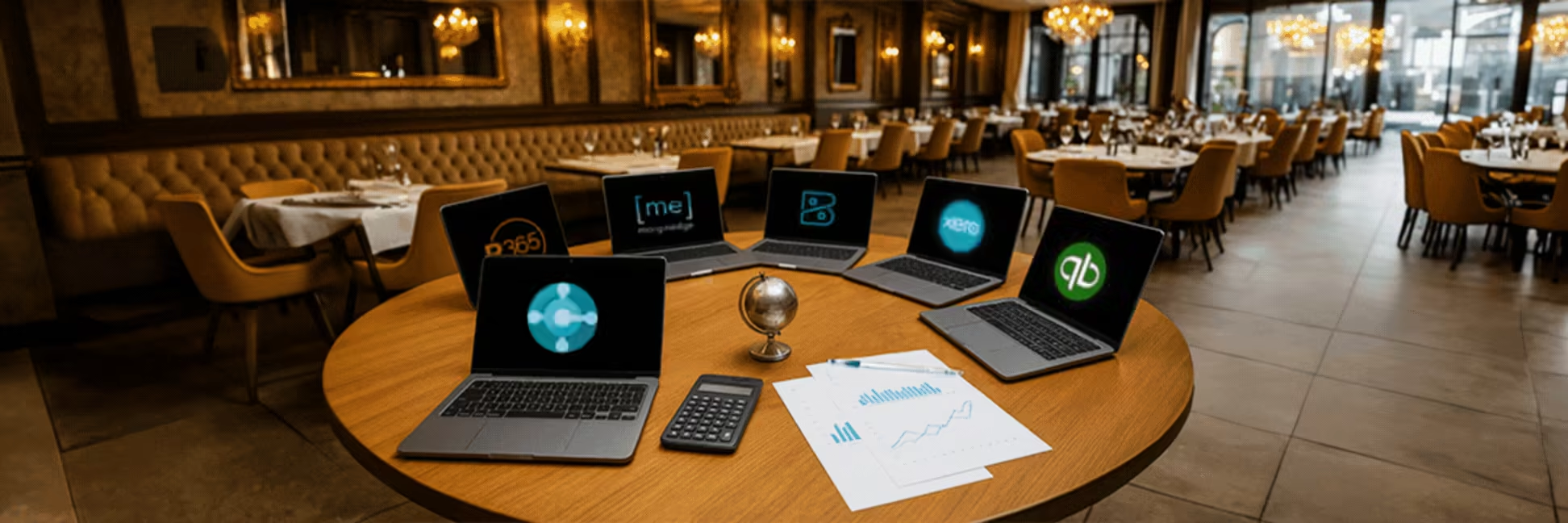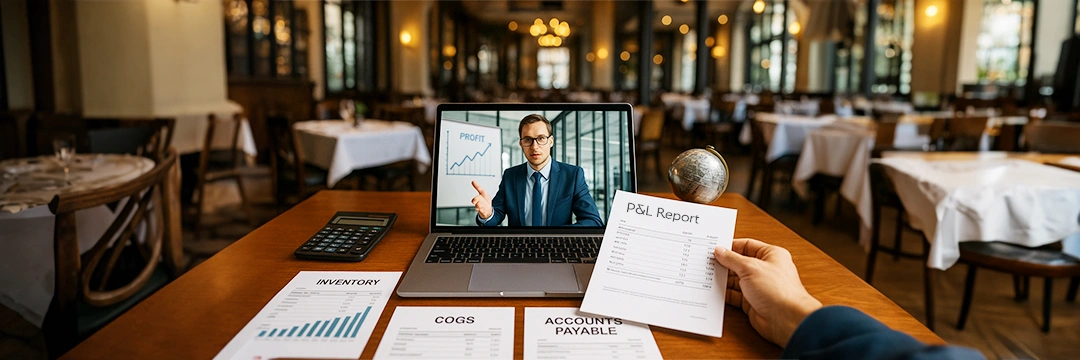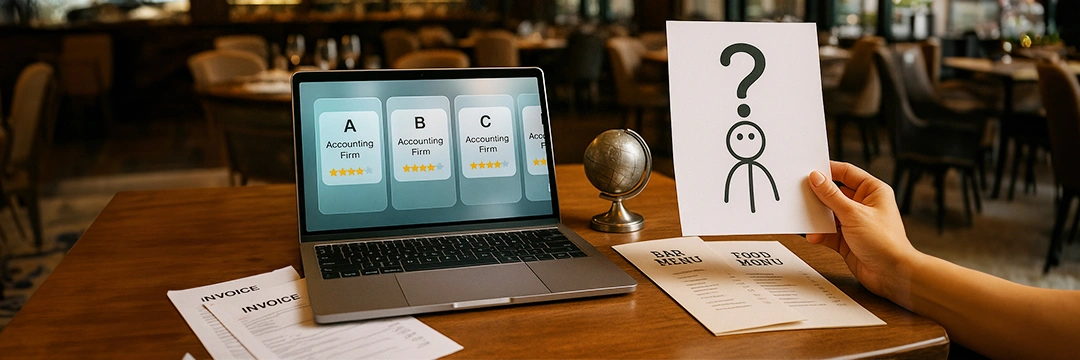In This Blog Post
Share This Article
- Published: Aug 18, 2025
- Last Updated: Dec 26, 2025
- 🔊 Listen
Quick Reads
- Outsourced restaurant accounting offers a practical solution to the burnout of financial management, allowing owners to focus on their kitchen and guests.
- Unlike general accounting, restaurant accounting is unique due to its focus on syncing POS systems, tracking Cost of Goods Sold (COGS), managing variable labor costs, and handling capital expenditures.
- Restaurants in the US face specific financial hurdles, including a high volume of low-value transactions, significant cash flow fluctuations, and complex multi-state and local tax compliance.
- Outsourcing restaurant accounting can be a strategic asset, providing up to 60% savings on overhead costs compared to an in-house team.
- A wide range of functions can be outsourced, from daily bookkeeping, accounts payable, and payroll processing to more strategic tasks like menu costing, budgeting, and tax preparation.
- When choosing a firm, look beyond cost; prioritize providers with proven restaurant-specific experience, strong tech proficiency, robust data security, and a communication model that fits your needs.

Numbers That Serve
Strategic Finance Support For Restaurant Professionals.
For many US restaurant owners, the stress of managing finances, from chasing invoices to preparing for tax season is a major source of burnout. Your energy should be spent on providing quality guest experience, not your books. Outsourced restaurant accounting offers a practical solution for this. By entrusting these tasks to specialized experts, you alleviate your mental workload and gain the peace of mind that your financial are in order, allowing you to run your business with renewed focus and passion.
How is Restaurant Accounting Different From General Accounting?
Unlike general accounting, restaurant accounting revolves around syncing Point of Sale systems with inventory management, tracking Cost of Goods Sold (COGS) and labor costs, managing capital expenditure, applying accurate revenue recognition, and meeting strict tax compliance all in a fast-paced environment. Here’s how it differs and what makes it unique.
Point of Sale
In restaurant accounting, POS systems are directly linked to accounting software to capture daily sales, multiple payment types, and split bills in real time. Unlike general accounting, it also manages table orders, tips, and discounts, ensuring accurate revenue tracking and faster reconciliation for high-volume daily transactions.
Inventory Management
Accounting for restaurants involves tracking perishable stock, monitoring ingredient usage, and adjusting orders based on menu demand. Contrary to general accounting, it focuses on minimizing waste, controlling supplier costs, and linking inventory data to sales, allowing more precise food cost analysis and improved purchasing decisions.
Cost of Goods Sold (COGS)
In hotel accounting, COGS calculations consider ingredient prices, seasonal cost fluctuations, and wastage, not just raw material costs. This detailed tracking helps identify profitable and underperforming menu items, enabling pricing adjustments and better supplier negotiations something rarely as granular in general business accounting.
Labor Cost
Accounting for restaurants requires detailed labor cost control, factoring in variable shifts, seasonal staff, overtime, and tips. Unlike standard payroll processes in general accounting, it accounts for fluctuating schedules and tip reporting requirements, ensuring accurate wage allocation and compliance with hospitality-specific labor regulations.
Capital Expenditure
Restaurant accounting tracks high-use, high-depreciation assets like kitchen equipment, furniture, and point-of-sale hardware. Unlike general accounting, it plans for frequent replacements, tracks warranty and maintenance costs, and ensures depreciation schedules match the shorter operational lifespan of restaurant assets.
Revenue Recognition
In accounting for restaurants, revenue recognition must handle multiple streams dine-in, delivery, takeaway, and catering while separating taxable and non-taxable sales. Moreover, it ensures each revenue type is correctly categorized for accurate reporting, compliance, and performance analysis across channels.
Compliance and Taxes
Restaurant accounting must manage food and beverage sales tax, tip reporting, and compliance with local health regulations alongside standard tax requirements. This is more complex than general accounting, which typically deals with uniform tax rules, making specialized knowledge essential for accuracy and risk reduction.
What Accounting Challenges Restaurant Owners in the US Face?
Restaurant owners in the US struggle with a packed list of financial hurdles processing countless low-value transactions, handling unpredictable cash flow, and managing payroll with detailed tip reporting.
They must keep food and beverage costs under control, navigate multi-state and local tax compliance, manage vendor payments, reconcile multiple payment platforms, and generate precise reports that support strategic choices. Let’s look all these in detail.
Managing High-Volume, Low-Value Transactions
Restaurants process hundreds or even thousands of sales daily, most of them for small amounts. Each transaction can involve variations dine-in, takeout, delivery, discounts, and tips.
Tracking every sale accurately, ensuring the point-of-sale (POS) system records match accounting records, and reconciling them with bank deposits can be time-consuming. Without proper processes, errors can accumulate and distort financial reports.
Cash Flow Fluctuations
Cash flow in restaurants is highly volatile due to fluctuating sales, seasonal changes, and unpredictable foot traffic. For example, holidays or local events may spike sales, while off-seasons can bring steep drops.
On top of that, fixed expenses like rent, utilities, and salaries continue regardless of sales volume. Without effective cash flow forecasting and monitoring, owners risk delays in vendor payments, payroll issues, and even temporary operational disruptions.
Food & Beverage Cost Control
The cost of goods sold (COGS) primarily food and beverage costs is one of the largest expenses for a restaurant. Tracking ingredient prices, controlling portion sizes, reducing waste, and preventing theft are constant challenges.
Even minor inefficiencies, like over-ordering perishable items or inconsistent portioning, can significantly reduce profit margins over time. Maintaining accurate inventory counts and comparing them to sales data is essential for spotting issues early.
Multi-State and Local Tax Compliance
Sales tax rules for restaurants in the US vary not only by state but also by county or city. Prepared food is often taxed differently from groceries, with filings on forms like California’s BOE-401-A2, New York’s NYS-45, Texas’s 01-117, or Florida’s DR-15.
Multi-location or cross-jurisdiction operations must track rates, exemptions, and due dates, as late or incorrect filings risk penalties, interest, audits, and increased scrutiny from tax authorities.
Vendor Payment Management
Restaurants rely on multiple suppliers for food, beverages, equipment, and services. Balancing timely payments to maintain supplier relationships with the need to conserve cash is a delicate task.
Missing payment deadlines can strain vendor relationships, while paying too early can reduce liquidity. Additionally, tracking invoices, applying credits, and avoiding duplicate payments requires a structured accounts payable process.
Reconciling Multiple Payment Platforms
Modern restaurants accept payments through various channels like cash, credit/debit cards, mobile wallets, and third-party delivery apps like DoorDash, Uber Eats, and Grubhub. Each comes with its own processing fees, settlement times, and reporting formats.
Reconciling these payments to ensure all sales are accounted for and fees are correctly recorded can be a manual, error-prone task without proper integration between POS, accounting software, and bank accounts.
Financial Reporting for Decision-Making
Restaurant owners need timely, accurate reports to make informed business decisions. These include daily sales summaries, weekly profit and loss statements, labor cost reports, and inventory usage reports. However, many small and mid-sized restaurants lack streamlined reporting systems, leading to delays or inaccuracies in financial insights. Without up-to-date data, decisions about menu pricing, staffing, or promotions are often based on guesswork rather than facts.

Best Accounting Software for Restaurant Accounting in the US
Efficient restaurant accounting depends on software that can handle industry-specific needs like POS integration, inventory tracking, COGS monitoring, and detailed reporting.
Solutions such as QuickBooks, Xero, Restaurant365, MarginEdge, Zoho Books, and MS Dynamics offer tailored features to simplify financial management, boost accuracy, and save time. Here’s our roundup of the best choices for your business.
QuickBooks
QuickBooks is a popular choice for restaurant accounting, offering POS system integration to track daily sales, tips, and multi-payment transactions. It automates payroll, manages vendor payments, and monitors COGS alongside labor costs. Its strong reporting tools provide profitability insights, making it ideal for restaurants that need an all-in-one, easy-to-use accounting platform.
Xero
Xero supports accounting for restaurants through cloud-based access, enabling real-time updates on sales, expenses, and stock. Its POS and inventory integrations help track ingredient usage, reduce waste, and manage supplier costs. Multi-location tracking and automated bank feeds make it ideal for restaurant owners operating multiple outlets with centralized financial control.
Restaurant365
Restaurant365 is built solely for restaurant accounting, combining POS integration, inventory management, scheduling, and payroll in one platform. It automates COGS tracking, recipe costing, and vendor invoice processing.
The software’s industry-specific dashboards provide insights on margins, sales trends, and operational costs, making it highly effective for both independent restaurants and large chains.
MarginEdge
MarginEdge focuses on real-time restaurant accounting by automating invoice entry, tracking COGS, and integrating recipe costing directly from supplier invoices. Its direct POS link provides daily performance data, allowing instant menu or pricing adjustments. This makes it ideal for restaurants wanting tight cost control without sacrificing speed in day-to-day operations.
Zoho Books
Zoho Books offers affordable, customizable features for accounting for restaurants, including tax compliance, invoice automation, and expense categorization. Its integration with POS and payment gateways streamlines transaction recording, while reporting tools track profitability at both item and location levels. It’s a cost-effective choice for small to mid-sized restaurants seeking automation.
MS Dynamics
Microsoft Dynamics is suited for large-scale restaurant accounting, combining finance, HR, inventory, and operations under one system. It offers advanced analytics, multi-location financial consolidation, and automated vendor and payroll management. The platform’s scalability and robust reporting make it ideal for restaurant chains that require consistent control and real-time financial oversight.
How Outsourced Accounting for Restaurant is Beneficial for US Businesses?
For US restaurants, outsourced accounting services can be a strategic asset cutting operating costs, bringing in industry-specific expertise, and delivering real-time financial insights. It ensures compliance and tax accuracy, improves cash flow control, and allows owners to scale without stress.
With advanced technology, automation, and flexible engagement models, it frees up valuable time to focus on core operations. Here’s how it can benefit your restaurant business.
Lower Operating Costs
Outsourcing restaurant accounting reduces overhead by eliminating the need for full-time accounting staff and related expenses such as salaries, benefits, and training. On average, restaurants can achieve up to 60% savings on these overhead costs by paying only for the services they need. These savings can be redirected to core operations such as improving menu quality, marketing, or upgrading customer service facilities.
Industry-Specific Expertise
Outsourced providers specializing in restaurant accounting understand the unique demands of the industry POS integration, inventory control, COGS tracking, tip allocation, and health department compliance.
This expertise ensures accurate books, precise cost management, and adherence to hospitality-specific regulations, helping restaurants avoid mistakes common when working with general accountants unfamiliar with the sector.
Real-time Financial Insights
With outsourced accounting for restaurants, owners gain access to live dashboards tracking sales, labor costs, inventory usage, and profit margins. This constant visibility enables immediate adjustments to pricing, staffing, or purchasing.
Instead of relying on outdated monthly reports, decision-making becomes proactive, allowing issues to be addressed before they impact profitability.
Compliance and Tax Accuracy
Restaurant accounting involves complex compliance needs, including sales tax on food and beverages, tip reporting, payroll regulations, and local health authority requirements. Outsourced professionals ensure accurate filings, timely submissions, and proper documentation. This reduces the risk of audits, penalties, and operational disruptions while keeping financial records clean and inspection-ready.
Better Cash Flow Control
Outsourced restaurant accounting helps maintain steady cash flow by closely monitoring receivables, payables, and seasonal expense fluctuations. Accurate forecasting ensures suppliers are paid on time, payroll is covered, and funds are available for operational needs. This proactive approach prevents cash shortages and supports healthier financial planning throughout the year.
Scalability Without Stress
As restaurants expand, their transaction volume, supplier relationships, and payroll demands grow. Outsourced accounting scales to match this growth without requiring additional in-house staff or infrastructure. Whether opening new locations or adding services, restaurants can increase capacity while keeping financial processes accurate, timely, and cost-efficient.
Technology and Automation Benefits
Outsourced providers use advanced tools that integrate POS systems, inventory management, and payroll into one streamlined process. Accounting Automation eliminates repetitive manual tasks like invoice entry and bank reconciliation, reducing errors and speeding up reporting. For restaurants, this means more accurate data, faster decision-making, and less administrative burden on internal teams.
Owner Time Freed for Core Operation
By shifting financial management to experts, restaurant owners can dedicate more time to menu innovation, staff development, and improving customer experience. Outsourced restaurant accounting removes the stress of bookkeeping, compliance checks, and tax filing, allowing owners to focus on activities that directly generate revenue and strengthen brand reputation.
Flexible Engagement Model
Outsourced restaurant accounting offers tailored service options from handling single functions like payroll to complete financial management. Restaurants can choose services that match their budget and business stage. This flexibility ensures they receive professional accounting support without being tied to costly, long-term commitments or unnecessary service bundles.
Which Restaurant Accounting Functions Can Be Outsourced?
Restaurants can outsource a wide range of accounting functions from day-to-day bookkeeping and month-end close to managing accounts payable and receivable. These virtual accountants can handle bank reconciliations, payroll processing, and detailed tracking of inventory, COGS, and menu costing.
They can also deliver accurate financial reporting, provide project-based advisory support, and manage budgeting, tax preparation, and compliance. Here’s a closer look at which functions can be outsourced to boost efficiency and accuracy.
Bookkeeping and Close
In restaurant, bookkeeping involves recording daily POS sales, vendor invoices, payroll entries, and expense receipts. Outsourced bookkeepers categorize transactions, maintain general ledgers, and reconcile accounts regularly.
Month-end close includes verifying data accuracy, adjusting entries, and producing clean financial statements. This ensures owners have up-to-date, error-free records without managing the time-consuming process in-house.
Accounts Payable and Receivable Management
Managing accounts payable and receivable in restaurant accounting involves tracking supplier invoices, verifying purchase orders, processing vendor payments, and following up on customer or catering invoices.
Outsourcing these functions ensures timely settlements, stronger vendor relationships, and steady cash inflows. It also reduces missed payments or collection delays, which can directly impact inventory purchases and operational continuity in restaurants.
Bank Reconciliation
Bank reconciliation in restaurant accounting matches POS sales, card settlements, supplier payments, and payroll disbursements with bank statement entries.
Outsourced teams use accounting software to detect discrepancies, correct errors, and detect fraudulent transactions. This provides restaurant owners with an accurate cash position and prevents operational issues caused by incorrect balances or delayed deposits.
Payroll Processing
Payroll goes beyond basic wage calculations it includes tip allocation, overtime, seasonal staff adjustments, and compliance with wage laws. Outsourced payroll managements services ensures accurate payments, timely tax submissions, and error-free reporting. Professionals handle complexities like multi-state payroll and benefits deductions, freeing owners from administrative burdens while keeping employee satisfaction high.
Inventory, COGS and Menu Costing
This area of restaurant accounting tracks ingredient purchases, monitors stock usage, and measures wastage to calculate accurate COGS. Outsourced specialists prepare recipe-level costing to ensure menu prices reflect actual expenses. They also generate inventory valuation reports to guide purchasing decisions, reduce waste, and protect profit margins from fluctuating supplier costs.
Financial Reporting
Financial reporting in accounting for restaurants covers profit and loss statements, balance sheets, cash flow reports, and performance dashboards. Outsourced providers prepare accurate, timely reports with industry-specific metrics like food cost percentage and labor-to-sales ratios. These insights help owners identify profit leaks, benchmark performance, and make informed operational and investment decisions.
Project-Based Advisory
Project-based advisory includes services for expansion planning, menu profitability analysis, and cost-reduction projects. Outsourced experts provide data-driven recommendations, financial modelling, and ROI forecasting for specific initiatives. This short-term engagement gives restaurants specialized strategic input without the expense of retaining a full-time financial analyst.
Budget and Compliance
Budgeting involves forecasting sales, controlling operational costs, and aligning expenses with seasonal demand patterns. Outsourced accounting service providers create realistic budgets and ensure compliance with industry regulations, including labor laws and health codes. This proactive approach prevents overspending, keeps financial operations aligned with business goals, and ensures all statutory obligations are met.
Tax Preparation and Compliance
From Form 1099-NEC/MISC for contractor payments to beverage taxes, tip reporting, payroll returns, and corporate income tax submissions, every filing is handled with precision.
With outsourcing, calculations are accurate, deadlines are met for both IRS and state requirements, and complete audit-ready records are maintained. This results in lower risk of penalties, consistent compliance, and more time for owners to focus on running their business rather than managing paperwork.
How do I Transition From In-house to Outsourced Restaurant Accounting?
Moving from in-house to outsourced restaurant accounting starts with a clear plan, audit your current workflow, decide what to outsource and what to keep, set realistic transition timelines, train your team on new reporting and communication channels, lock in data migration and backup protocols, and monitor performance from day one. Let’s look at how to put this into action.
Audit Your Current Accounting Workflow
- Review all accounting activities like, daily sales recording, supplier invoices, payroll, bank reconciliations, and tax filings.
- Identify inefficiencies, bottlenecks, and recurring errors.
- Document existing processes and tools so your outsourcing partner has a complete picture of how things work now.
Identify Tasks to Outsource vs. Keep In-house
- Commonly outsourced tasks are accounts payable, accounts receivable, payroll, bank/credit card reconciliations, and monthly reporting.
- Keep in-house tasks like requiring on-site presence, such as cash handling or daily POS system entries if needed for operations.
- Match the complexity and confidentiality of each task with the outsourcing firm’s capabilities.
Set Realistic Timelines for the Transition Phase
- Plan a phased rollout for example, start with payroll and reconciliations in month one, then move to full bookkeeping by month three.
- Build in time for testing reports and verifying accuracy before completely switching off the in-house process.
Train Your Team for New Reporting and Communication Channels
- Introduce your staff to the outsourcing partner’s reporting dashboards, shared document portals, and communication protocols.
- Conduct short training sessions on submitting invoices, sending daily sales summaries, or raising queries with the remote accountants.
Establish Data Migration and Backup Protocols
- Migrate historical financial data to the new accounting platform, ensuring correct mapping of chart of accounts.
- Run parallel records for at least one reporting cycle to confirm data integrity.
- Set up secure backup systems to prevent loss of past and current records.
Monitor Performance
- Review KPIs such as turnaround time for reports, reconciliation accuracy, and error rates.
- Check compliance with tax deadlines, supplier payment terms, and internal reporting schedules.
- Hold review meetings regularly to address gaps and refine processes.
How To Find Your Right Outsourced Restaurant Accounting Firm?
Finding the right outsourced restaurant accounting firm means weighing more than just cost. Look for proven experience, industry-specific expertise, and strong tech skills to integrate seamlessly with your systems. Ensure their communication is clear, their data security protocols are robust, and their pricing offers real value. Let’s explore how to choose the best fit.
Choosing the Right Provider
Start with a Start by shortlisting firms that specifically offer accounting services for restaurants, cafes, or hospitality businesses. If hiring a freelancer, browse platforms like Glassdoor, LinkedIn, or Upwork to find profiles with relevant hospitality experience. For a complete range of services, consider top virtual accounting firms. In all cases, review their client portfolios, read testimonials, and ask for references from similar-sized restaurant operations to ensure they have the right expertise.
Check For Experience
Prioritize firms that relevant and direct restaurant accounting experience and employ qualified professionals such as ACCA, CMA, or CPA holders. These credentials ensure they understand both local compliance and international accounting standards.
Industry Expertise
Your chosen firm should understand restaurant-specific challenges such as tip reporting, food cost analysis, waste tracking, and vendor payment scheduling. Ask if they offer industry-tailored reporting formats like prime cost reports and daily sales summaries.
Tech Proficiency
Confirm they are skilled in software widely used in restaurants for example, QuickBooks, Xero, Restaurant365, or Zoho Books. They should also know how to integrate with POS systems like Square, Toast, or Lightspeed, and inventory tools like MarketMan or BlueCart.
Communication
Clear communication is critical for outsourced relationships. Check if they use reliable channels like Slack, Microsoft Teams, or Zoom for regular updates, and whether they can provide weekly or monthly review calls. Ensure they respond promptly to queries within agreed timelines.
Data Security Protocols
Ask about specific measures such as ISO 1900:27001 compliance, SOC 2 certification, multi-factor authentication for logins, and encrypted file-sharing platforms like Dropbox Business or ShareFile. They should have a clear disaster recovery plan in case of data breaches or system failures.
Price Comparison
Instead of only comparing hourly rates, assess the value of what’s included in the package number of transactions covered, frequency of reporting, access to financial dashboards, and tax support. Request detailed proposals so you can compare scope, deliverables, and costs side-by-side.
How Hiring Restaurant Accounting Expert Empower your Business with Financial Clarity and Control
Hiring a restaurant accounting expert empowers your business with the financial clarity and control needed to make informed, strategic decisions. From accurately tracking daily sales and managing food and labor costs to ensuring tax compliance and optimizing cash flow, the right expertise keeps your finances precise and your operations running smoothly.
At Whiz Consulting, we offer specialized restaurant accounting services tailored to the restaurant industry, with a deep understanding of POS integrations, inventory management, and industry-specific KPIs. Using advanced accounting software and proven processes, we streamline your bookkeeping, enhance financial visibility, and help you achieve greater profitability. Partner with us to gain the clarity, control, and confidence your restaurant needs to thrive.

Get customized plan that supports your growth








